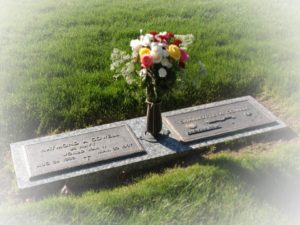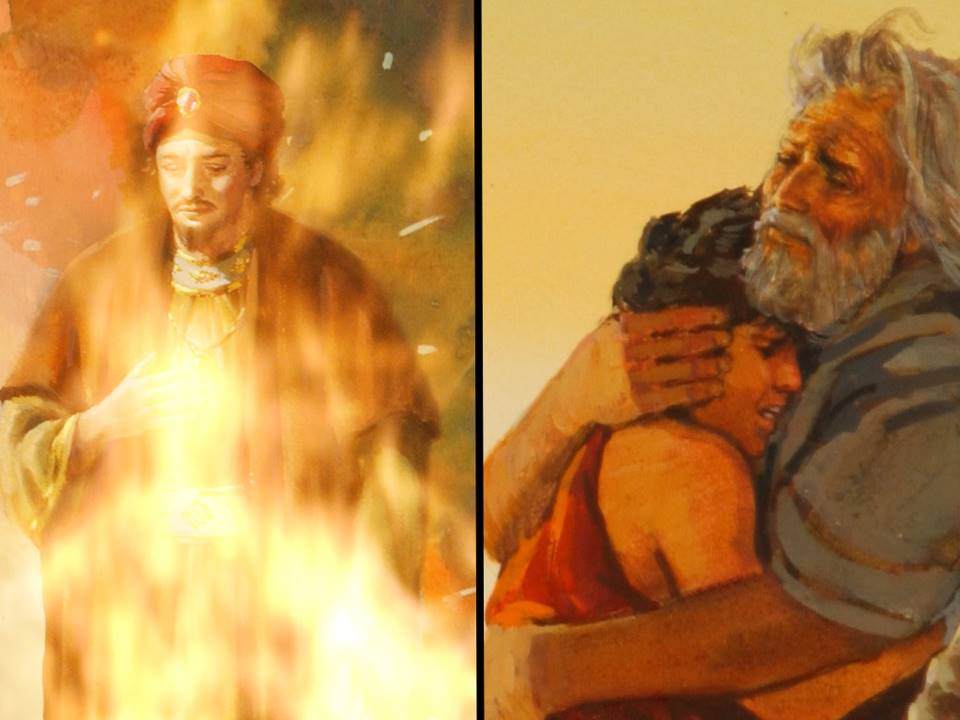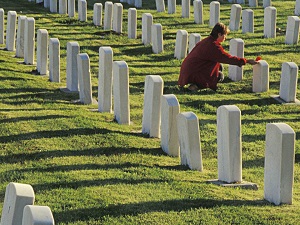
'by whom also He went and preached to the spirits in prison': An exposition on Peter's words in 1 Peter 3:19

Samuel Smith
23 Jan'19
5
LESSON 7
BY WHOM ALSO HE WENT AND PREACHED TO THE SPIRITS IN PRISON: AN EXPOSITION ON PETER'S WORDS IN 1 PETER 3:19
You are welcome to another edition of Insights from God's Word, a Bible study programme that is committed to sharing God's Word by allowing the Bible to speak for itself.In this edition, we continue with our series on The Truth About Death. In this study, I want us to consider the topic: "by whom also He went and preached to the spirits in prison": An exposition on Peter's words in 1 Peter 3:19.
A) The popular interpretation in regard to the above text within Christendom is that when Christ died, He descended into hell and actually preached to some spirits of dead people who have been bound in the prison house of hell. This teaching became very popular when the various mainstream Protestant denominations began to utilize the Catholic Church's Apostle's Creed for liturgical and catechetical purposes. The 12 stanzas of the apostle's creed are as follows:
1. I believe in God the Father, Almighty, Maker of heaven and earth:Friends, even though I have serious questions with some of the stanzas in respect to their consistency with Scripture (that is; stanzas 3 and 9), the 4th stanza of this creed has been the underlying catalyst in spreading the false interpretation associated with our key text in
2. And in Jesus Christ, His only begotten Son, our Lord:
3. Who was conceived by the Holy Ghost, born of the Virgin Mary:
4. Suffered under Pontius Pilate; was crucified, dead and buried: He descended into hell:
5. The third day He rose again from the dead:
6. He ascended into heaven, and sits at the right hand of God the Father Almighty:
7. From thence He shall come to judge the quick and the dead:
8. I believe in the Holy Ghost:
9. I believe in the holy Catholic Church: the communion of saints:
10. The forgiveness of sins:
11. The resurrection of the body:
12. And the life everlasting. Amen.
(Bold emphasis added to lines 3, 4 and 9)
B) Beloved, this teaching that Christ descended into hell, and preached to some dead spirits in the prison house of hell is contrary to the principle of the unity of the entire Scriptures (
Since the popular interpretation of
C) Friends, for us to obtain a clear understanding of difficult verses in Scripture, we need to consider among other things the entire passage in which the difficult text is positioned. And so in this segment of our study, we are going to consider the entire passage of
C1) 3:17 "For it is better, if it is the will of God, to suffer for doing good than for doing evil."
Key Explanation: The apostle Peter is basically saying here that we should suffer for well doing rather than to suffer for doing evil (see also
C2) 3:18 "For Christ also suffered once for sins, the just for the unjust, that He might bring us to God, being put to death in the flesh but made alive by the Spirit,"
Key Explanation: Christ once suffered the ultimate penalty on a cross for the sins of the human race (
53:7 He was oppressed, and he was afflicted, yet he opened not his mouth: he is brought as a lamb to the slaughter, and as a sheep before her shearers is dumb, so he openeth not his mouth.
53:8 He was taken from prison and from judgment: and who shall declare his generation? for he was cut off out of the land of the living: for the transgression of my people was he stricken.
53:9 And he made his grave with the wicked, and with the rich in his death; because he had done no violence, neither was any deceit in his mouth."
(
C3) 3:19 by whom also He went and preached to the spirits in prison,
Key Explanation: To understand this key text, it is important to note the progression of thought in the last part of verse 18 and the early part of verse 19. If we combine the last part of verse 18 and the early part of verse 19, we obtain the following text: "18...being put to death in the flesh but made alive by the Spirit, 19 by whom also He went and preached ... " This progression of thought brings out the clear point that the Spirit Who raised up Christ from the dead was the same Spirit through whom Christ preached. Thus friends, an important point we need to mark here is that it was not Christ Himself Who did the preaching; rather, He did it through the Holy Spirit.
Another key point that is clear from Scripture is that the Holy Spirit works through human agents (
From the verse 18, it becomes clear that this human agent who was filled by the Holy Spirit preached unto some spirits in prison. The word SPIRIT (pneumasin in Greek) as used in this text can refer to living people (see
i) "6 I the LORD have called thee in righteousness, and will hold thine hand, and will keep thee, and give thee for a covenant of the people, for a light of the Gentiles; 7 To open the blind eyes, TO BRING OUT THE PRISONERS FROM THE PRISON, AND THEM THAT SIT IN DARKNESS OUT OF THE PRISON HOUSE" (
ii) "The Spirit of the Lord GOD is upon me; because the LORD hath anointed me to preach good tidings unto the meek; he hath sent me to bind up the brokenhearted, TO PROCLAIM LIBERTY TO THE CAPTIVES, AND THE OPENING OF THE PRISON TO THEM THAT ARE BOUND" (
iii) "The Spirit of the Lord is upon me, because he hath anointed me to preach the gospel to the poor; he hath sent me to heal the brokenhearted, TO PREACH DELIVERANCE TO THE CAPTIVES, and recovering of sight to the blind, to set at liberty them that are bruised" (
Friends, from the passages of Scripture above, we learn that one of the mission statements of Christ for fallen humanity was to free us from the prison house of sin. Satan, the enemy of souls has made us captives of several sinful behaviours of which we have no inner power to free ourselves. From
Beloved, from the Bible, we learn that the Christian warfare is a spiritual warfare. The apostle Paul makes it clear that: "we wrestle not against flesh and blood, but against principalities, against powers, against the rulers of the darkness of this world, against spiritual wickedness in high places" (
Thus, our key text in
i) Who is the human agent through whom the Spirit of Christ preached?
ii) Which people were the recipients of this preaching?
Beloved, our very next text sheds light on these important questions above. The verse 20 of our key passage reads:
C4) 3:20 "who formerly were disobedient, when once the Divine longsuffering waited in the days of Noah, while the ark was being prepared, in which a few, that is, eight souls, were saved through water."
Key Explanation: Amazingly, the passage becomes clearer as we go along. We are told right from the beginning of the verse 20 that the spirits in prison were disobedient. That is to say, these people lived in sin. In other words, they were captives or slaves to various sinful behaviours as we have already noted (
C5) 3:21 "There is also an antitype which now saves us—baptism (not the removal of the filth of the flesh, but the answer of a good conscience toward God), through the resurrection of Jesus Christ,"
Key Explanation: Even as entering the ark was a public profession of faith in God during the time of Noah, so is Christian baptism a public profession of faith in Christ in our day. Even as those who entered the ark were saved through the waters, so will it be that all those who come to believe in Christ and are baptized, will be saved (
D) Thus friends, it is clear from the points we have gone through so far that our key text in
17 It is better to suffer for well doing than for evil doing. 18 In this respect, Christ gave us an example when He died for our sins so that He could reconcile us unto God. Even though Christ died, He was resurrected by the Spirit of God. 19 With the Spirit of God working through a human agent, that is Noah, Christ preached to the antediluvians who were bound in various sinful behaviours. 20 This action our Saviour performed, so that He could reconcile them also to God. But despite Noah's 120 years of Spirit - filled preaching, only eight souls were saved. 21 Even as entering the ark was a public profession of faith for the penitent during the time of Noah, so is baptism a public profession of faith in Christ in our day. Even as those who entered the ark were saved through the waters, so will it be that all those who come to believe in Christ and are baptized, will be saved.
Exhortation: This study clearly admonishes us to quickly respond to the voice of the Holy Spirit before it is too late. From the words of Christ in
In our next study, we will consider the topic: "For this reason the gospel was preached also to those who are dead...": An exposition on Peter's words in 1 Peter 4:6. The Bible Study references for this study are
Stay blessed and keep shining for King Jesus.
Maranatha!
Powered by White Throne Ministries












